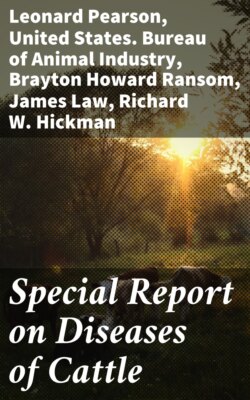Читать книгу Special Report on Diseases of Cattle - Lowe - Страница 22
На сайте Литреса книга снята с продажи.
DISEASES OF THE PHARYNX AND GULLET. PHARYNGITIS (SORE THROAT).
ОглавлениеPharyngitis is an inflammation of the mucous membrane lining the pharynx. It is frequently associated with inflammatory diseases of the respiratory tract, such as laryngitis and bronchitis or pleurisy.
Symptoms.—The muzzle is dry and the saliva dribbles from the corners of the mouth; the animal swallows with difficulty or not at all, and holds its neck in a stiff, straight position, moving it as little as possible. The eyelids are half closed, the white of the eye is bloodshot, and the animal occasionally grinds its teeth. After masticating the feed the animal drops it out of its mouth as if to avoid the pain of swallowing, and also evinces pain when pressure is applied externally on the pharynx and tries to prevent the pressure from being applied.
Causes.—Pharyngitis may be produced by a sudden cooling of the surface of the body, as when cattle are exposed to a cold wind or a cold rain; or by swallowing irritant substances.
Treatment.—The throat should be syringed three times a day with an ounce of the following solution: Nitrate of silver, 1½ drams; distilled water, 1 pint. Bland and soothing drinks, such as linseed tea or oatmeal and water should occasionally be offered. Diet should consist of soft food, such as bran mashes with a little linseed meal mixed in them. Dry hay and fodder should not be given. Fresh, green grass or sound ensilage may be fed in small quantities. The upper part of the throat and the space between the jaws should be well rubbed once a day with the following liniment: Liquor ammonia fortior, 4 ounces; oil of turpentine, 4 ounces; olive oil, 4 ounces; mix. When evidence of blistering appears the application of the liniment should be stopped and the skin anointed with vaseline. Under the treatment described above the inflammation of the throat will gradually subside and the animal will be able to swallow as usual in five or six days. We need hardly say that during its treatment the sick animal should be kept in a comfortable stable.
